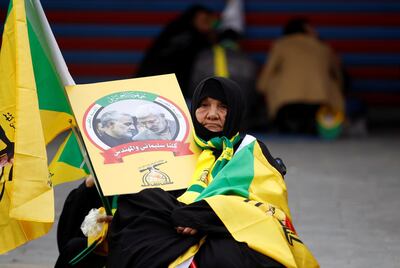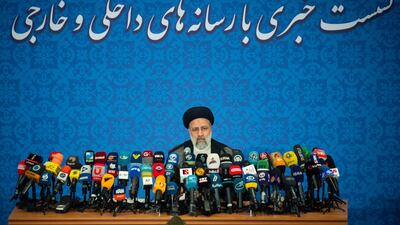The election of a prominent hardliner as Iran’s next president inevitably raises questions about the ability of his American counterpart, Joe Biden, to achieve his goal of renegotiating the Iranian nuclear deal.
Since taking office, Mr Biden has made clear his determination to revive the deal that Iran signed with the world’s major powers in 2015.
Mr Biden has even hinted that his administration would attempt to expand the terms of the original deal beyond the narrow confines of Iran’s uranium enrichment programme to include other troubling issues, such as the regime’s advanced ballistic missile programme and Iran’s continued meddling in the wider affairs of the Middle East.
Washington’s prospects of securing any result from the indirect talks currently taking place in Vienna between Iran and a number of Western officials have now become a great deal more challenging as a result of Ebrahim Raisi’s appointment as Iran’s eighth president since the country’s 1979 revolution.
Even before taking office, Mr Raisi, who is known to harbour strong anti-western views, has already made it abundantly clear that he has no desire to meet face to face with Mr Biden. Already sanctioned by the US, he would not be able to do so even if he wanted. Furthermore, in his first press conference since winning the country’s presidential election contest, the 60-year-old Mr Raisi has warned that he has no interest in including other issues, such as Iran’s missile programme, in any revived form of the nuclear deal.
Add to this the increased tensions between Washington and Tehran over Iran’s continued support for Iraq-based militias, which have been accused of mounting attacks on US bases, and it is clear that Mr Biden and his European allies face an uphill struggle.

Concerns have been expressed in Washington that Iran-backed militias are deliberately targeting American bases in Iraq as a means of intensifying pressure on the Biden administration to achieve a quick conclusion to talks over the nuclear deal happening in Vienna.
The US responded earlier this week by launching air strikes against the Iranian-backed Kataib Sayyid Al Shuhada militia, killing four of its supporters, which it accused of launching attacks against American bases.
The American action prompted angry protests in Iraq, organised by militia leaders, but US Secretary of State Antony Blinken was unrepentant, claiming the American action was aimed at sending “a very important and strong message” to Iran to prevent further attacks by pro-Iran militias.
In such circumstances, and with tensions between Washington and Tehran seemingly increasing by the day, it is difficult to see how Mr Biden can achieve his goal of reviving the nuclear deal.
Nevertheless, despite these inauspicious omens, it could be argued that Iran’s dire economic predicament suggests that the regime is desperate to revive the nuclear deal simply because it needs the punitive economic sanctions regime imposed by former US President Donald Trump to be lifted at the earliest opportunity.
Should that happen, Iran’s desire to have the sanctions lifted could outweigh its objections to making any further concessions on its nuclear programme and open the way for a new deal.
Certainly, if Mr Trump’s aim of implementing a policy of “maximum pressure” against Tehran was designed to cripple the Iranian economy, then it has certainly achieved its objective according to Iran’s latest economic data.
Tehran has seen the value of the rial halve in the past year, while inflation is running at 50 per cent and the country is facing widespread unemployment. Figures recently released by the International Monetary Fund suggest Iran’s foreign reserves have collapsed from around $140 billion at the time Tehran signed the nuclear deal in 2015 to just $4bn today, although this is disputed by Iran’s banking authorities.
Moreover, the collapse of the Iranian economy has fuelled nationwide political unrest, with anti-government protesters accusing the regime of wasting money funding its overseas military activities instead of concentrating its efforts on rebuilding the economy.
The dramatic deterioration in Iran’s economic fortunes is certainly having an impact on Iran’s attempts to expand its influence in the Middle East. In Lebanon, for example, the financial collapse means that Tehran is no longer able to continue paying its Hezbollah allies in dollars.
For decades, Hezbollah’s popularity in southern Lebanon has been based on the lavish welfare payments it has invested in the country, thereby helping it to become one of the dominant forces in Lebanese politics.
Now, thanks to the collapse of the Iranian economy, Hezbollah can no longer afford to make payments in dollars, instead opting for the Lebanese pound, which has collapsed in value by a staggering 900 per cent during the past year.
Hezbollah’s financial difficulties have prompted Bahaa Hariri, the son of former Lebanese prime minister Rafik Hariri, who was murdered by Hezbollah terrorists in 2005, to question whether Hezbollah will be able to maintain its current level of power in Lebanon without Iranian support.
"Hezbollah is not a success story in Lebanon anymore because it is very much responsible for the economic collapse of Lebanon,” said Mr Hariri, who last month helped to launch the Sawa reform movement aimed at reviving Lebanon’s political and economic fortunes.
“Some die-hard supporters will maintain their allegiance to Hezbollah, but many others will no longer be prepared to support the movement's objectives if the welfare support Hezbollah has been providing collapses."
Iran’s financial difficulties in Lebanon, as well as other parts of the Middle East, certainly suggest that, despite the continuing anti-western rhetoric coming out of Tehran, there might still be an opportunity for the US and its allies to negotiate a new nuclear deal.
And if that is the case, then this time Washington should aim to conclude a deal that addresses the wider issues of Tehran’s malign activities in the region instead of focusing solely on nuclear enrichment.
Con Coughlin is a defence and foreign affairs columnist for The National


